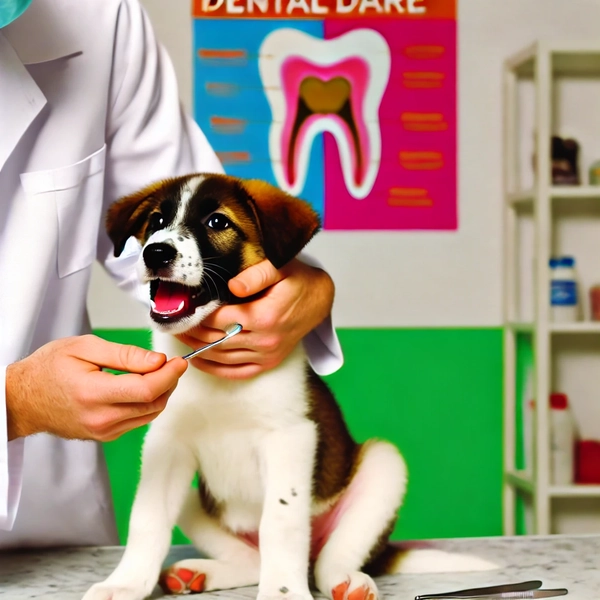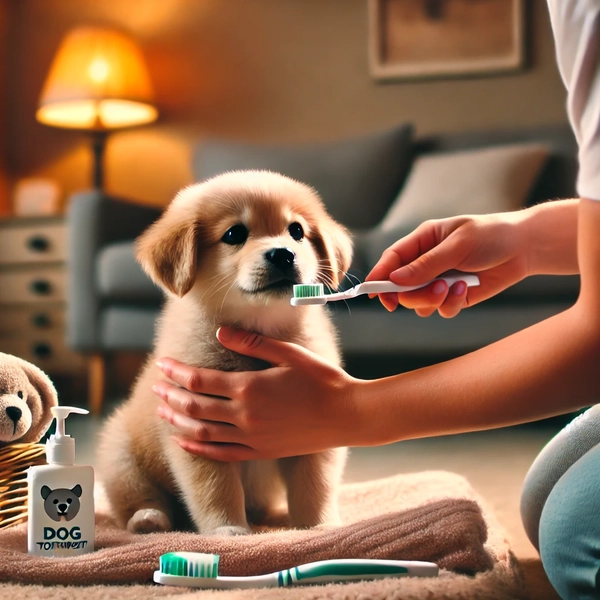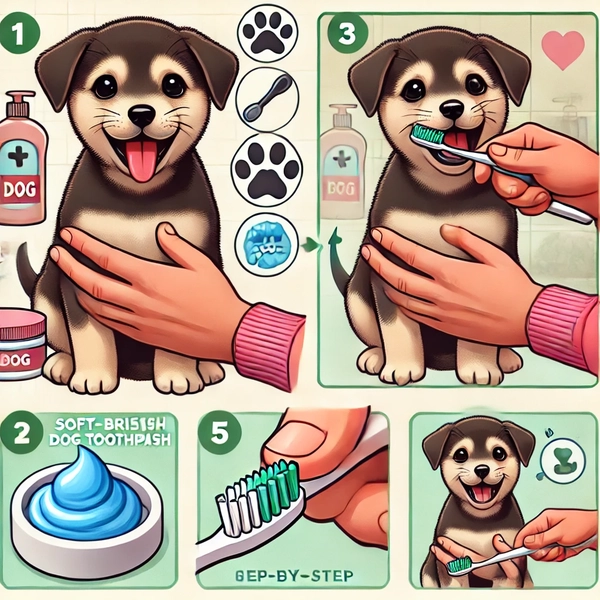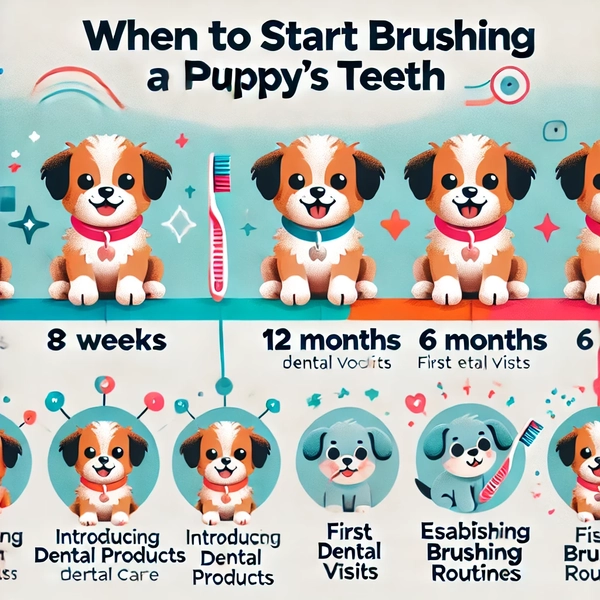How to brush a puppy’s teeth for the first time? Puppies are like babies; they need dental care regularly to avoid such degenerate issues.
The sooner you perform this training, the more fun and accessible it will be for your pet. First, let’s see the fundamental principles of brushing puppy teeth for the first time.
Do Puppies Visit Dentists?

So, before starting the brushing process in this section, let us first explain why oral care for puppies is essential.
- Elimination Of Bad Breath: The bad omens of the puppy’s mouth will be less noticeable with the regular cause of tooth brushing.
- Prevention of Dental Issues: Just like every one of us, a healthy puppy will have to draw the line at having their parents pay for a tooth cavity, and therefore, teeth will need care.
- Improves Overall Health: Maintaining and cleaning your puppy’s teeth and gums will benefit their health. However, other complications would follow if dental health is taken for granted.
Interesting Story
Would it amaze you to find out that approximately eighty percent of dogs will exhibit some form of dental disease by age three? That’s just one great reason not to put it off for long!
What You Will Need to Brush Your Doggy’s Teeth
First, procure the following supplies:
| Item | Purpose |
| Dog Toothbrush | A soft-bristled toothbrush designed for dogs. |
| Dog Toothpaste | Special toothpaste made for dogs (never use human toothpaste). |
| Treats | To reward your puppy after brushing. |
| A Calm Space | A quiet area where your puppy feels comfortable. |
Picking the Correct Toothbrush
What should be looked out for when selecting a puppy toothbrush?
- What qualities should a puppy toothbrush possess when buying one?
- Bristle Hardness: These soft bristles will be gentle on your puppy’s tender gums.
- Dimension: A toothbrush should fit the mouth of the puppy being cleaned.
Choosing the Right Toothbrush
What qualities should a puppy toothbrush possess when buying one?
- Bristle Hardness: These soft bristles will be gentle on your puppy’s tender gums.
- Dimension: A toothbrush should fit the mouth of the puppy being cleaned.
Choosing Dog Toothpaste
It is advisable to purchase toothpaste that has been formulated for dogs. Why? As the toothpaste for humans is harmful to dogs. Given this, here are some points to note:
- Taste: There is poultry/peanut-flavored toothpaste for dogs to make brushing their teeth easier for them.
- Xylitol: This ingredient is dangerous for pets, so caution should be exercised when using dog paste that contains it.
Preparing Your Puppy For Teeth Brushing

Before you jump into brushing, it is essential to prepare your puppy first. Here is how to do it:
- Make the Place Comfortable: Use a calm environment, like in a corner where your puppy feels at ease.
- Let them Sniff What Works For Them: Let your puppy familiarize itself with the brush and paste by smelling them.
- Start With Small Steps: Using your finger, rub your puppy’s gums slowly.
How to Brush Your Puppy’s Teeth for the First Time

It shouldn’t be that in reality. It can be made an enjoyable and easy task instead.
Step 1: Packed Items
Before doing anything else, ensure that you have this:
- Dog Toothbrush: This is a pet brush with the softest bristle.
- Dog Toothpaste: That is dog-friendly (never use regular human toothpaste).
- Treats: In the end, for crawling to the puppy after a cleaning session.
- Calm Environment: Sad that it’s like this; however, a quiet and comfortable place for you and the puppy will do.
Step 2: Prepare Your Puppy
- Make Enhancement: Get somewhere your puppy is at ease and quiet.
- Introductions: Let your puppy become acquainted by letting them smell the brush and the toothpaste.
- Start with Finger Rubbing: Using the most affordable toothbrush, one can simply use the finger to rub the puppy’s gums as an introduction to a toothbrush.
Step 3: Start Brushing
Choose a Comfortable Position Anyone in one position will do the following:
Sit on the floor, either with the puppy in your lap or the puppy in another position. If the puppy is a bit fidgety, someone can help by gently holding the puppy.
Apply Toothpaste:
Figure 1: Apply dog toothpaste the size of a pea on a toothbrush or index finger.
Lift Your Puppy’s Lip:
Gently lift their lip to expose the teeth. This helps you clean the parts that need cleaning.
Begin Brushing:
Start brushing the outer surfaces of the back teeth of their mouths. With the inner portion for the maximum cleaning of the gums and the teeth, circular motions should be performed on the teeth and the gum.
Pay attention to the rear molars since they accumulate the most plaque.
Be Gentle. Expect chicken teeth and gums to be sensitive. If they appear uneasy, take a break and comfort them.
Lastly:
Brush for approx. 305 – 60 seconds. If the puppy is resistant, do not push; it is possible to teach him another time.
Stage 4: Appreciation to the Puppy After Brushing
After brushing or grooming your pet, remember to give your puppy treats or praise them to their delight. This will enable them to connect the experience with affection.
Brushing Tips
- Consistency is Key: Always try to brush the puppy at least a few times per week. Gradually progress with the frequency of brushing as the puppy gets accustomed to it.
- Stay Calm. Petting a puppy may depend on one’s mood. If you are at ease, then a puppy will be at ease inside.
- Use Finger Brushes First: Do not be discouraged if the puppy is shy. Use a finger brush, which will be easier to control and help soften the puppy into the process.
Common Challenges
Your puppy may not naturally accept brushing their teeth the first time you do it. This is what usually happens, and these are ways you can solve each of them
| Challenge | Solution |
| Puppy Resists Brushing | Start with shorter sessions and increase time gradually. |
| Puppy Bites the Toothbrush | Use a finger brush until they get used to it. |
| Puppy Won’t Stay Still | Try brushing when your puppy is tired or after playtime. |
When to Start Brushing Your Puppy’s Teeth

It is a fact that the earlier you brush your teeth, the easier it will be for them to accept the procedure. Regarding puppies, please aim to commence brushing their teeth when they are approximately 8 to 12 weeks old.
Further Dental Hygiene Recommendations
Apart from dental cleaning, below are some recommendations that can help promote the healthy development of your puppy’s teeth:
- Chewing Toys Should Be Provided: Use chewing toys as they facilitate the cleaning of the puppy’s teeth in a biological way.
- Annual Veterinary Exams: Let your regular veterinary appointment include a dental examination.
- Try Interactive Chewing Dental Treats: Some healthy chewable treats help clear teeth of plaque and tartar.
Monitoring Your Puppy’s Dental Health
Look into your puppy’s mouth now and then for any of the following indications of oral diseases:
- Foul Breath: Uncharacteristic foul breath from your puppy can point to oral cavity diseases.
- Bleeding Gums: Gums that are not red and swollen indicate good health.
- Inability to Eat: A vet visit may be necessary if your puppy is having difficulty eating or chewing.
Regular Dental Visits
Be sure to have periodic dental cleanings with your veterinarian. Professional cleanings can be done, and any areas of concern can be addressed.
Summary
How to brush a puppy’s teeth for the first time? Cleaning a puppy’s teeth need not be an impossible undertaking. However, with some practice and commitment to the task, you can structure the necessary regimen to ensure their teeth are healthy and intact.
Start with baby steps, make it fun, and always watch their teeth. These tricks will ensure that your puppy has a happy and healthy smile.
Brushing! 🐶